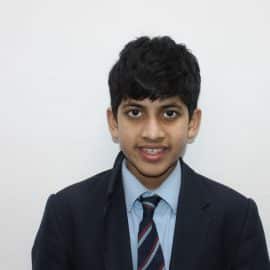English
Our aspiration for the study of English is that it should offer boys a way of exploring and understanding the world around them, with all its different challenges and perspectives, through the lens of literature.
To achieve this understanding, we aim for students to communicate effectively as perceptive, analytical, and critical thinkers, using literature to engage with a broad range of ideas and viewpoints.
Our English curriculum is built on the foundation of textual choices that are both ambitious and inspirational; students will consider how the language can be used in dynamic and ever-changing contexts, and be among the powerful tools to shape the world which we inhabit. Pupils study a variety of texts which span the centuries, from Chaucer and Shakespeare, through Shelley and Steinbeck, through to Duffy and Gupta. We aim to help them find literature which they enjoy reading and which enhances their understanding of the world, be that through novels, poetry or drama, and to appreciate that reading widely and diversely is instrumental to developing as confident, able, and responsible young men.
While literature starts with plot and character, we aim to teach pupils the ability to see the author’s craft and skill behind these texts that we read for pleasure. We examine and evaluate, analysis and assess how texts are written, the choices that writers make, and how comparisons can be made between various approaches.
Indeed, both language and literature bring readers into contact with important opinions and perspectives – whether those are social (like Gupta’s The Empress), ecological (such as Golding’s Lord of the Flies), or intensely personal, such as the texts in our opening autobiography unit. All texts can help boys develop empathy towards the viewpoints of others. We do not shy away from discussing controversial issues in challenging texts; for example, issues of political or personal conflict in poetry, or aspects of what makes us human in texts such as Stevenson’s The Strange Case of Doctor Jekyll and Mr Hyde or Shelley’s Frankenstein.
The range and depth of our text choices is matched by our ambition to create writers who draft with style, individuality, and technical precision, where our focus on the control of accurate spelling, punctuation and grammar forms the toolkit of a successful writer. Quality is far more important than quantity: while offering opportunities for extended writing, we also work on the ability of students to be succinct and precise, and to use language economically. Pupils plan, draft, and re-draft work, polishing and improving their efforts to reflect the best of their ability.
Alongside skills in reading and writing, we aspire for our students to become excellent communicators of the spoken word. English lessons are based on the essentiality of discussing and debating issues at every opportunity. Through the cut and thrust of such debate, they learn that they can argue forcibly and passionately, yet without jeopardising friendships. We believe that texts should not just be read on a page, but that performance constitutes a vital part of sharing and enjoying texts. Through competitions such as the Performing Shakespeare and Poetry by Heart events, as well as regular visits to theatres across London, we ensure boys are given opportunities both to perform, and to watch performances of the highest standard.
The study of English, then, provides students with some of the most important gifts they could hope to take away from the classroom – their own understanding of the world around them, formed in partnership with the eyes of others from throughout different time periods and social settings, and their own voice with which to respond. With these skills combined, pupils are successfully able to forge their own paths in the world and workplaces of the future.
Old Elizabethans: Leading journalist
Aidan Radnedge (OE 1988-1995) is both a successful print journalist and a published author. Aidan won awards in a number of subjects at school, including History and Politics, but chose to read English at Birmingham University.
After a career reporting from trouble spots around the world, including Iraq, Afghanistan and Zimbabwe (at a time when foreign journalists were banned), he took up the role of Chief Reporter at Metro, which in 2017 overtook The Sun to become the UK’s biggest weekday newspaper by circulation.
He has written a number of books on sport, following in the footsteps of his father Keir Radnedge, a noted football journalist.

Head of English: Mr Robert Hyland
Mr Hyland started teaching in secondary education in 2014 and worked at a school in Southampton, before moving to QE in 2017. A graduate of Oxford, he was previously Access and Admissions Officer at the university’s Trinity College. He has worked with Teach First, a charitable organisation aimed at improving socio-economic inequality through education. He has delivered training for teachers at conferences around the UK and has helped new entrants to the profession within schools, providing observation and feedback.
“Perhaps unsurprisingly, what I love most about my subject is reading! A good novel is able to tell a story in a way rarely seen in film or TV. I find that good readers make good writers: you are exposed to a far wider range of ideas and possibilities than any one person could think of.
“I am particularly interested in teaching Shakespeare; there are few authors as versatile and dynamic as Shakespeare, whose language is so poetic, and whose plays simultaneously work on so many different levels.
“I find the boys enthusiastic and imaginative in their approach to English, and especially to literature: it’s not uncommon to find 30 different viewpoints in a class of 25!”
Mr Hyland is pursuing a doctorate in education in his spare time and serves as an OCR GCSE examiner.

Pupil perspective: analysing, deducing and inferring
Pranav Challa enjoys the complexity of characters in texts and the multiple layers he can unpick and explore: “The characters may be dramatised and drawn from the realms of fiction, but I appreciate that they mirror real-life people and scenarios.” Pranav says that during his English lessons his understanding of the aspects of the subject that involve logical deduction and argument formulation has grown. “I am able to put down my ideas and my logical train of thought on to paper far more effectively.”
Pranav is a keen member of the Debating Club. “I particularly enjoy formulating rebuttals!” He hopes in the future to put his analytical and inference skills to the test: “I want to pursue a career in social sciences, or in the media or journalism.”

